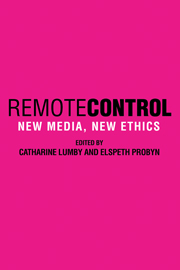Book contents
- Frontmatter
- Contents
- List of Contributors
- Acknowledgements
- 1 Introduction: An Ethics of Engagement
- 2 Real Appeal: The Ethics of Reality TV
- 3 Arguing about Ethics
- 4 ‘Their own media in their own language’
- Beyond the Disconnect: Practical Ethics
- 5 A Viable Ethics: Journalists and the ‘Ethnic Question’
- 6 Ethics, Entertainment and the Tabloid: The Case of Talkback Radio in Australia
- Money versus Ethics
- 7 Eating into Ethics: Passion, Food and Journalism
- Beyond Food Porn
- 8 Ethics impossible? Advertising and the Infomercial
- Pitching to the ‘Tribes’: New Ad Techniques
- 9 Diary of a Webdiarist: Ethics Goes Online
- 10 Control-SHIFT: Censorship and the Internet
- Representing the Asylum Seekers
- 11 The Ethics of Porn on the Net
- Ethics and Sex
- 12 Grassroots Ethics: The Case of Souths versus News Corporation
- 13 Great Pretenders: Ethics and the Rise of Pranksterism
- The Limits of Satire
- Index
2 - Real Appeal: The Ethics of Reality TV
Published online by Cambridge University Press: 18 December 2009
- Frontmatter
- Contents
- List of Contributors
- Acknowledgements
- 1 Introduction: An Ethics of Engagement
- 2 Real Appeal: The Ethics of Reality TV
- 3 Arguing about Ethics
- 4 ‘Their own media in their own language’
- Beyond the Disconnect: Practical Ethics
- 5 A Viable Ethics: Journalists and the ‘Ethnic Question’
- 6 Ethics, Entertainment and the Tabloid: The Case of Talkback Radio in Australia
- Money versus Ethics
- 7 Eating into Ethics: Passion, Food and Journalism
- Beyond Food Porn
- 8 Ethics impossible? Advertising and the Infomercial
- Pitching to the ‘Tribes’: New Ad Techniques
- 9 Diary of a Webdiarist: Ethics Goes Online
- 10 Control-SHIFT: Censorship and the Internet
- Representing the Asylum Seekers
- 11 The Ethics of Porn on the Net
- Ethics and Sex
- 12 Grassroots Ethics: The Case of Souths versus News Corporation
- 13 Great Pretenders: Ethics and the Rise of Pranksterism
- The Limits of Satire
- Index
Summary
IT WAS AN UNSCRIPTED MOMENT WHEN 60 MINUTES REPORTER CHARLES Wooley jumped up on stage to perform Big Brother housemate Sara-Marie Fedele's infamous ‘bum dance’ for the studio audience. The occasion was the penultimate eviction night in the show's first Australian series and Wooley was there to document this weird new genre for his viewers. Until he took to the stage, his approach to the story had been one of amused professional detachment. But as he stared out into a sea of pink bunny ears that were being sported by hundreds of teenage Fedele fans, you could see the recognition dawning on his face that Big Brother might not be just another flash in the youth culture pan – that maybe there was something groundbreaking in this reality TV stuff; that maybe, just maybe, he was staring out at the future of TV.
Despite years of living with the incessant public attention that a TV profile brings, Wooley was clearly stunned by the fascination generated by a bunch of ‘ordinary’ people who'd agreed to live in the Big Brother house and have their lives recorded daily and broadcast nightly to television viewers. ‘Why are they famous?’ Wooley kept asking the fans and experts he interviewed. ‘What have any of them done?’ The stir Wooley's own presence created amongst the studio audience lent more than a touch of irony to his remarks.
- Type
- Chapter
- Information
- Remote ControlNew Media, New Ethics, pp. 11 - 24Publisher: Cambridge University PressPrint publication year: 2003
- 8
- Cited by



